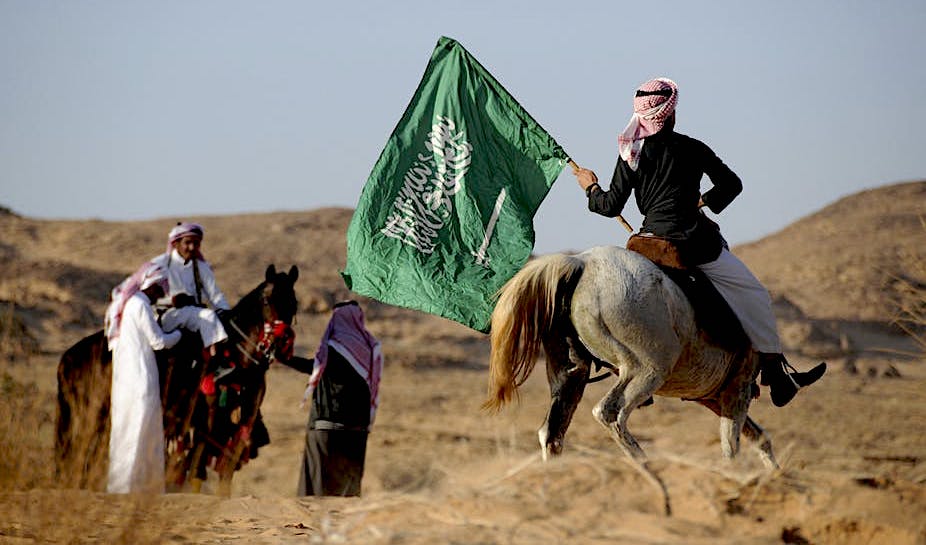Saad Ahmad for BeyondHeadlines
With the charismatic rise of MBS (Muhammad bin Salman, the crown prince of Saudi Arabia), the world is witnessing a liberal face of Saudi Arabia dictating both national and international politics at the same time. The reform-centric attitudes are being hailed by the international community while de-ideologization of the Saudi state, as MBS indicated in his interviews, caused remarkable appreciation too. In this regard, the change in Saudi’s state referring incompatibility of Wahhabism with a techno-industrial shift in the Kingdom raised other significant issues to be discussed such as the absence of Wahhabism in pre-Afghan War, use of the terminology in post-Afghan-War Jihad, subsequent entry of revolutionary Iran against Saudi’s Wahhabism and hitherto official proclamation of the very term as derogatory.
MBS’s national and international interviews boasted about ru’ya al-Saudia 2030 (vision 2030), not only as Saudi dream in pursuit of worldly-happiness but as the major contributor to the eco-political order of Saudi liberalism. The national vision of Saudi Arabia also includes attention to gender issues such as travel without a guardian (muhrim), political participation and driving. Recognising the importance of cultural expression, for instance, theatrical arrangement and engagement with arts, music and sports, luxury tourism resort, focused consideration for wearing a bikini in allowed areas of the resort in calculated future, Saudi state is opening creative opportunities to its citizens.
Considering gender segregation, a menace of the society which Saudi Ulama considered Islamic for so long, MBS wants to break the social taboo such as physical education (in early 2017) for both boys and girls, attending events related to sports for both men and women and most importantly the right to drive (in effect June 2018). The system of male guardianship (wali), one of the major theme discussed to propagate a moral order in the universe of Islamic jurisprudence which deals with society.
The erstwhile religious police of Saudi Arabia got diminished while ideological thinking of Islam, even though not, in anticipation is being suppressed episodically. Despite recent experiences in the region, Saudi Arabia impressed other authoritarian regimes by telling them about the blockade that contagious disease out of Arab spring remained failed, within Saudi Arabia too since social media was barred from peeping out of windows. There were no success stories of yamul ghazab (Day of rage) as dissents were captured and protests were subjected to dispersion.
Saudi Arabia is engaged in a long-term security project in the region through which a Gulf-centric strategy to introduce the common enemy for both Arab state and Arab society is identified. The common enemy is expansionist Iran as a state and Persian Shi’ism as a society. Waging sectarian war in Syria, exploding Iraqi society and fixing ideological dynamite in Lebanon and Yemen are flying images of destructive Iran in Arab land as projected by Saudi Arabia’s state paraphernalia abroad. As seen during the last nine months, two auxiliary agencies to infiltrate the Sunni world were Qatar and Palestine, another success story of Iranian expansionism. For an Islamic revolutionary, both Qatar and Palestine were maintaining their emotional magnetism by satellite forms towards its orbit considering it the sacred service for Ummahood.
“Un-Islamic” Islams and Saudi’s “Moderate Islam”:
Ideological Islam might have embraced an argumentative Sunni scholar. For Saudi Arabia, all form of ideological Islam is akin to revolutionary Islam, hence Iranian in spirit. Not forgetting the 9/11, the official intention to re-locate Saudi’s Islam at moderate scale recommends domestication of religion by Saudi ethics in the market. From argumentative Islam to authoritative, from self-calculative to reflective, not discussing monarchical or republic Islam, all form of Islam against Saudi normative scale is either radical or revolutionary. It includes Yusuf al-Qardawi’s well-known attempt to introduce a jurisprudential understanding of Islam to the modern world, Muslim Brotherhood (Egypt) and Erdogan’s burden of political Islam. “Un-Islamic” Islam also means curbing independent ventures such as Qatar’s extensive project to absorb Islamic subjectivities.
Re-drawing the imagination of Saudi spirit is the wisdom of MBS, for whom, ‘moderate Islam’ was lost in reactionary strategies against the Iranian Revolution. As national strategies revolved around strict doctrines Saudi leaders could not find other creative ways of dealing with the issue, says liberal leadership of Saudi Arabia to the world media. In this context, can invalidating Wahhabism in favour of corporatised interest of the state mean declaring all kind of political motivations in non-Saudi Muslim societies as the enemy of Islam? How should replacing hitherto recognised norm about the woman in an Islamic society with right-led consciousness of the Saudi elite not be considered un-Islamic? Why can truth on the tongue of MbS about an Israeli homeland not mean survival of both states, Israel and Saudi state? Narrating a range of activities and their interpretations of Islam as un-Islamic, how seriously moderate Islam be meant for tempering spirit of moderation in Islam? How provocatively would moderate Islam not ask its place in the liberal universe of the West?
Thus, a variety of reforms and development within Saudi Arabia tries to allure the world by its liberal worldview about tourism, issues related to women have been captured by state-sponsored feminism. While, on the other hand, political fronts upon that Saudi ideology relied for half a century worldwide and caused to ingrain a confrontational presentation of Islam in world society including India; how stealthily could the state exit from the gate which was made to enter resisting and reforming attitudes earlier? This time, the question of Islam lies not in the narration that Saudi Arabia is a monarchy and Islam is not, but it asks whether Saudi Arabia’s proclamation for a moderate Islam intends to qualify the liberal standard or the theological arguments which caused to emerge the modern existence of Saudi-state itself?
(Author is a PhD scholar at Jawaharlal Nehru University, New Delhi)






















